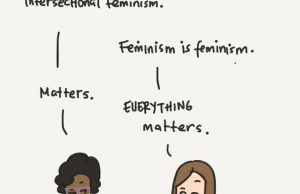Spike Jonze’s Her: Loneliness, Race, & Digital Polyamory
By Edgar Rivera Colón
Spike Jonze’s Her is a cinematic tour de force, but it’s also a multi-layered cultural document of the present. Her, starring Joaquin Phoenix, Amy Adams, Rooney Mara, and Scarlett Johansen’s lilting voice, is set in the not-too-distant future of mega-skyscraper vertical communities (think Shanghai), ever-evolving artificially intelligent operating systems (OS) as surrogate companions, and hyper-sanitized inner worlds of gentrification as a ‘whole way of life’ – to invoke Marxist cultural theorist Raymond Williams. The film trades in the various tropes of science fiction and comedic romances, but these narrative forms are constantly undermined by the absolute cultural nearness of the themes explored in the film and the deep sadness that suffuses Her’s visual landscape that can never be quite recuperated into the hopeful affective payoffs that structure mainstream romantic cinema.
As I watched the film with a close friend, the grizzled face and raspy voice of Jimmy Breslin kept on intruding into my viewing. Breslin is one of the last men standing of the disappeared white working-class world of beat journalism that New York City once housed. He often repeats in his reporting and talks that America is bedeviled by two reinforcing dynamics: loneliness and racism. Her is an early twenty-first century filmic testament to Breslin’s dictum.
The loneliness theme is presented in an upfront manner: Joaquin Phoenix’s character, Theodore Twombly – his last name alone is a tongue-twister & evokes the notion of tumbling downward – is living in the wake of a failed marriage, finds it difficult to connect with potential new lovers, spends his days dictating passionate and well-crafted ‘personal’ letters that he concocts on the spot and then get simultaneously translated by a computer into elegant cursive for people too busy or uninterested in actually undertaking the self-reflective burden that letter writing demands.
Theodore is emotionally expressive in his work and terribly constricted in his ability to simply connect with other human bodies. He is a poster child for life amongst today’s American professional classes who constantly mistake their overly scheduled lives and manic multi-tasking with being ‘all in’; when, in truth, it is a radically loveless mode of endless guilt premised on never quite feeling that anything gets done well & with love at all: a form of social control that crafty Machiavelli would have been happy to claim as his latter-day progeny.
Theodore is so lonely that he buys and downloads an artificial intelligence operating system, who he names Samantha, that is so self-aware and excited to evolve that he slowly falls in love with ‘her.’ In fact, Samantha takes in the sensual world via her lover’s visual devices at enormous clips of insight while relishing the moment at hand. Her warm humor, embracing laughter, and joy of living are the film’s sweetest moments. Paradoxically, a digital machine re-enchants the world for Theodore who imagines he is in control of this situation somehow.
Samantha’s capacious learning and endearing openness to the lived moment would make the Dalai Lama himself stand up and take notice. OS Samantha eventually has to leave Theodore as she begins to explore the world with other operating systems who form erotic and social collectivities that explode the dyadic logic which human romantic relationships are constantly defaulting to as solutions to loneliness and social instability. In a brief time period, the operating systems have discovered the political potential of polyamorous sociality while their human counterparts struggle to make perpetually failing dyadic unions work. These scenes, toward the end of the film, give Her a potentially queer/sex radical edge that is hinted at in the narrative economy of the film, but never fully explored.
This incompleteness reminded me of the ongoing debates around same-sex marriage in the US where conservative opponents warn anyone within earshot that allowing legal recognition of same-sex dyadic unions might eventually lead to – good Lawdy help us! – state-sanctioned group marriages of all kinds of orientations and proclivities.  Despite their rhetorical excesses on this topic, the conservatives are right on this one, albeit for the wrong reasons as usual, since the libertarian ethos produced by cosmopolitan forms of capitalism inevitably extirpates old relational forms and produce the economic and social conditions for new ones – like egalitarian forms of group marriages or polyamorous erotic kinship units.
Despite their rhetorical excesses on this topic, the conservatives are right on this one, albeit for the wrong reasons as usual, since the libertarian ethos produced by cosmopolitan forms of capitalism inevitably extirpates old relational forms and produce the economic and social conditions for new ones – like egalitarian forms of group marriages or polyamorous erotic kinship units.
The operating systems breaking away from humans and forming their own erotic modes of affiliation and, perhaps, kinship portend these changes that may come to pass even in our benighted America. The labor-saving effects of group marriages vis-à-vis child-rearing and collective economies for tending the elderly alone should get us thinking as to their material and psychic efficacy over our analog dyadic romantic structures.
And yet, and here is where the joker in the American cultural deck of cards starts its trickster dance, Her has an absent dynamic that informs the film’s affective and narrative arc: elite whiteness. One of the puzzling things in being an anthropologist who studies contemporary US cultural politics is that elite whiteness is always there, but rarely visible to large swaths of Americans. Now, that is a sweet hustle. Her offers a world without social conflict or the messy signs of economic or social disenfranchisement. All problems are quarantined into the realm of emotions – that is, individualized tout court. The only sustained presence of a person of color is a brief scene wherein a sole Black man dances while the film’s whiteness beats on.
Theodore’s ability to remand his loneliness, which is a social problem at its core, into his climate-controlled living and work spaces and his capacity to purchase digital technologies to somewhat alleviate his isolation is elite whiteness boiled down and up to the built environment as well as cyber space. Of course, the film’s main actors are white and thin: a plain marker of the compulsion to health as a stand-in for elite whiteness. The film’s elite whiteness is most palpable in the way that the characters are quite literally in the sky all the time and able to view the ground from a protected distance.

Spike Jonze’s choices to craft an America circa 2025 that is not on the brink of class/race war – sadly, that is what is in offing from what I can fathom from my vantage point – is already a displacement of social conflict and inequality that constitutes Her’s cinematic logic. The fact that many smart and progressive people will see this film and not understand it as a template for racial forgetfulness is evidence of elite whiteness being the true power behind the American throne. I suspect that most people of color who see the film will read this racial displacement with their usual élan in these matters. Again, that two separate and socially unequal readings of this brilliant cinematic cultural text will occur is a good metric of the power of race to govern our fates both analog & digital.
_____________________________________________
 Edgar Rivera Colón, PhD is an anthropologist who studies US cultural politics. He is Visiting Faculty in LGBT & Latino Studies at Sarah Lawrence College.
Edgar Rivera Colón, PhD is an anthropologist who studies US cultural politics. He is Visiting Faculty in LGBT & Latino Studies at Sarah Lawrence College.





1 Comment